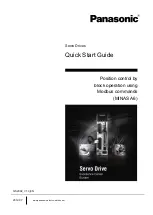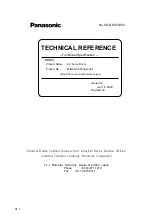
Appendix D-4
DBT Reach Drive User Manual
Motor NP FLA (42) is multiplied by Motor OL Factor (48) to select the rated current for
the motor thermal overload. This can be used to raise or lower the level of current that
will cause the motor thermal overload to trip. The effective overload factor is a
combination of Motor OL Hertz (47) and Motor OL Factor (48).
Motor Overload Memory Retention Per 2005 NEC
The Reach Drive (firmware version 4.002 or greater) has the ability to retain motor
overload count at power down per the 2005 NEC motor overtemp requirement. To
Enable/Disable this feature, refer to the table below. Once Enabled, the value for
Testpoint 1 Sel (234) may be changed.
Overspeed
Overspeed Limit is a user programmable value that allows operation at maximum
speed, but also provides an “overspeed band” that will allow a speed regulator such as
encoder feedback or slip compensation to increase the output frequency above
maximum speed in order to maintain maximum motor speed.
The figure below illustrates a typical Custom V/Hz profile. Minimum Speed is entered
in Hertz and determines the lower speed reference limit during normal operation.
Maximum Speed is entered in Hertz and determines the upper speed reference limit.
The two “Speed” parameters only limit the speed reference and not the output
frequency.
The actual output frequency at maximum speed reference is the sum of the speed
reference plus “speed adder” components from functions such as slip compensation.
Figure D.4 – Changing Overload Factor
Table D.1 – Overload Retention
Overload
Retention
Testpoint 1 Sel (234)
Testpoint 1 Data (235)
Enable
“529”
“529”
Disable
“529”
1
1
Default setting
“0”
1
Changing Overload Factor
0
10
20
30
40
50
60
70
80
90 100
% of Base Speed
Contin
uous Rating
OL % = 1.20
OL % = 1.00
OL % = 0.80
0
20
40
60
80
100
120
140
















































